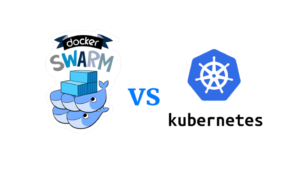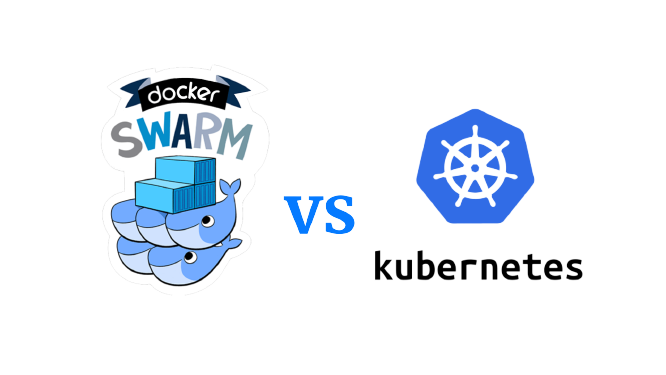Container orchestration is the process of automating the deployment, scaling, and management of containers. Containers are lightweight, portable, and self-contained units of software that can run on any platform.
In the world of container orchestration, Kubernetes and Docker Swarm are two popular choices. Both platforms are designed to manage and deploy containers at scale. However, there are significant differences between the two, and choosing the right platform for your needs is essential.
In this blog post, we’ll explore the differences between Kubernetes and Docker Swarm and help you choose the right container orchestration platform for your needs.
What is Container Orchestration?
Before we dive into the differences between Kubernetes and Docker Swarm, let’s first define container orchestration. Container orchestration is the process of automating the deployment, scaling, and management of containers. Containers are lightweight, portable, and self-contained units of software that can run on any platform. Container orchestration platforms are used to manage and deploy containers across multiple hosts, ensuring that applications are highly available, scalable, and resilient.
Kubernetes
Kubernetes is an open-source container orchestration platform developed by Google. It’s designed to automate the deployment, scaling, and management of containerized applications. Kubernetes is highly extensible and provides a robust set of APIs that enable developers to customize and extend the platform to meet their specific needs. Kubernetes has a large and active community, making it one of the most popular container orchestration platforms in use today.
Docker Swarm
Docker Swarm is a container orchestration platform developed by Docker. It’s built into the Docker platform and is designed to be easy to use and deploy. Docker Swarm is highly scalable and can run on any infrastructure, including on-premise, cloud, or hybrid environments. Like Kubernetes, Docker Swarm is open-source, and it has a large and active community of developers.

Differences Between Kubernetes and Docker Swarm
There are significant differences between Kubernetes and Docker Swarm that are worth considering when choosing the right container orchestration platform for your needs.
-
The architecture of Kubernetes and Docker Swarm
Kubernetes has a highly modular architecture that has a design to be highly extensible. It consists of several components, including the master components and worker nodes. The master components are responsible for managing the worker nodes and scheduling containers. The worker nodes run the containers and communicate with the master components.
Docker Swarm, on the other hand, has a simpler architecture. It consists of a manager node and worker nodes. The manager node is responsible for managing the worker nodes and scheduling containers. The worker nodes run the containers and communicate with the manager node.
-
Scalability of Kubernetes and Docker Swarm
Both Kubernetes and Docker Swarm are highly scalable and can support large-scale deployments. However, Kubernetes is known for its ability to scale to very large clusters, making it an ideal choice for organizations that need to deploy and manage complex container applications.
-
Extensibility of Kubernetes and Docker Swarm
Kubernetes is highly extensible and provides a robust set of APIs that enable developers to customize and extend the platform to meet their specific needs. Docker Swarm, on the other hand, has a design to be easy to use and deploy, with fewer customization options.
-
The complexity of Kubernetes and Docker Swarm
Kubernetes is a highly complex platform that requires a significant amount of time and resources to deploy and manage. It has a steeper learning curve than Docker Swarm, and it’s recommend for organizations with experience DevOps teams.
Docker Swarm, on the other hand, has designed to be easy to use and deploy. It’s ideal for organizations that are new to container orchestration or have limited DevOps resources.
Choosing the Right Platform
When choosing the right container orchestration platform for your needs, consider your specific use case, your team’s expertise, and your scalability requirements.
If you have a complex containerized application and require a highly scalable platform with robust customization options, Kubernetes may be the right choice for you. However, if you’re new to container orchestration or have a smaller, less complex application, Docker Swarm may be a better fit.
Ultimately, the choice between Kubernetes and Docker Swarm will depend on your specific needs and goals. Both platforms have their strengths and weaknesses, so it’s important to carefully evaluate each one before making a decision.
Conclusion
In the world of container orchestration, Kubernetes and Docker Swarm are two of the most popular options. While both platforms have their unique features and benefits, it’s important to choose the one that’s best suit for your specific needs.
Whether you choose Kubernetes or Docker Swarm, container orchestration can help simplify and streamline your application deployment process, allowing you to focus on what matters – developing high-quality, reliable software that meets the needs of your users.
As container technology continues to evolve, we can expect to see many new developments in the world of container orchestration. Whether you’re just starting with containers or looking to take your container deployment to the next level, there’s never been a better time to explore the world of container orchestration and find the platform that’s right for you.
Explore the world of container orchestration with Tanbits‘ DevOps services. Our experienced team can help you navigate the evolving landscape of container technology and find the platform that’s right for your business. From starting with containers to taking your container deployment to the next level, we can guide you through the process and ensure a successful implementation. Contact us today to learn more.
BACK










